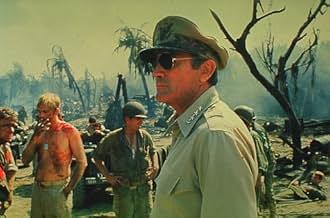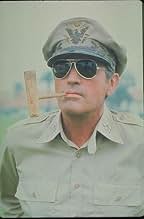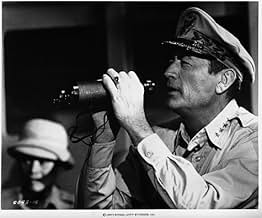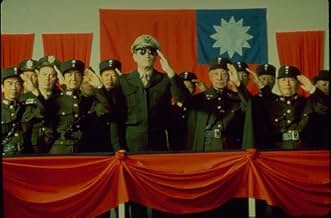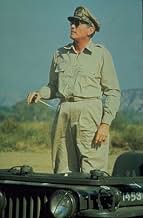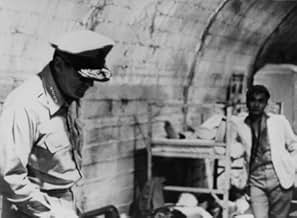IMDb RATING
6.5/10
5.5K
YOUR RATING
Biopic of General Douglas MacArthur covering his war exploits during WW2 and the Korean War.Biopic of General Douglas MacArthur covering his war exploits during WW2 and the Korean War.Biopic of General Douglas MacArthur covering his war exploits during WW2 and the Korean War.
- Awards
- 2 nominations total
Russell Johnson
- Admiral King
- (as Russell D. Johnson)
- Director
- Writers
- All cast & crew
- Production, box office & more at IMDbPro
Featured reviews
Like the Movies made about Jesus Christ, no one is going to Agree about its complete Accuracy or Decisions concerning the Time Period covered. It's virtually an Impossible Task to present a Total Conception and with Budget and Running Time Restrictions adding to the Limitations.
Most WWII Historians, Armchair or otherwise, tend to give Gregory Peck a nod and are Thankful that His Liberal Leanings did not Cloud His Judgement or Portrayal of the Dynamic and Controversial General.
It is Well Known that MacArthur was Hell Bent on Crafting an Image of Himself as Larger than Life. The Movie has a few Scenes where His Aides Instruct the Newsreel Cameraman to Film the General from a Low Angle, "He loves that technique.". He used Props (corncob pipe) to give Himself a Unique Flair and His Filmed Entrances are Legendary.
MacArthur was not only a Brilliant General, He was a Brilliant Man. His Eloquent way with Words, making His Arguments and displayed Insights with a Poetic Zeal. All of the Aforementioned is seen in this Even Handed Account, originally Made-for TV than Edited for a Theatrical Release.
The Film is Sweeping in Concept, if not in Presentation. It's somewhat Low-Budget renders a Flat Production, but it makes up for it with Peck's Command of the Role and an Appropriately Wordy Script.
Above Average and a Powerful Portrayal of just over a Decade in the Complicated and ever Interesting Leader who was much Loved by the American People, the Philippines, and Japan (for His compassionate and intelligent restructuring of the island's ashes).
President Truman did not Worship the General, as many did and the Movie ends with MacArthur Relieved by the Commander and Chief. It seems even the Accomplished Military Leader was Unable to "Walk On Water", and was Symbolically Crucified by the President.
Most WWII Historians, Armchair or otherwise, tend to give Gregory Peck a nod and are Thankful that His Liberal Leanings did not Cloud His Judgement or Portrayal of the Dynamic and Controversial General.
It is Well Known that MacArthur was Hell Bent on Crafting an Image of Himself as Larger than Life. The Movie has a few Scenes where His Aides Instruct the Newsreel Cameraman to Film the General from a Low Angle, "He loves that technique.". He used Props (corncob pipe) to give Himself a Unique Flair and His Filmed Entrances are Legendary.
MacArthur was not only a Brilliant General, He was a Brilliant Man. His Eloquent way with Words, making His Arguments and displayed Insights with a Poetic Zeal. All of the Aforementioned is seen in this Even Handed Account, originally Made-for TV than Edited for a Theatrical Release.
The Film is Sweeping in Concept, if not in Presentation. It's somewhat Low-Budget renders a Flat Production, but it makes up for it with Peck's Command of the Role and an Appropriately Wordy Script.
Above Average and a Powerful Portrayal of just over a Decade in the Complicated and ever Interesting Leader who was much Loved by the American People, the Philippines, and Japan (for His compassionate and intelligent restructuring of the island's ashes).
President Truman did not Worship the General, as many did and the Movie ends with MacArthur Relieved by the Commander and Chief. It seems even the Accomplished Military Leader was Unable to "Walk On Water", and was Symbolically Crucified by the President.
There isn't much argument that MacArthur was a good strategist and a brave man. And that's the picture you get of him in this movie. Besides a bit of vanity, only the slightest, the general seems to have no flaws. The dark side of this genius is missing.
Of course no movie, not even at 130 minutes, can capture all of a man's professional history, but the lacunae here are convenient ones. The upshot is that this is like one of those John Singer Sargent portraits of society women that made them look sexier and prettier than they probably were.
For instance, MacArthur remarks somewhere along the line that his casualties are fewer than anyone else's (or something like that) when in fact those figures have been contested. MacArthur's aching desire to invade China is turned into a kind of a joke, when he complains that he is only allowed to bomb the southern entrances to bridges across the Yalu River -- "In all my career, I've never learned how to bomb HALF A BRIDGE." Very amusing. But then his political views as a whole, which were somewhere to the right of Attila the Hun's, are skipped over. His run for president fizzled because not even the most rabid anti-communist power broker wanted a war with China, but this too is turned into a morbid joke, when MacArthur remarks to his wife about the newly elected Eisenhower -- "He'll make a great president. He was the best clerk I ever had." (Eisenhower's joke appears elsewhere -- "I spent seven years under MacArthur studying dramatics.") The most illustrative revelation of MacArthur's character isn't in the film. MacArthur recruited Weldon E. Rhoades as the personal pilot of his B-17 and the aviator became a loyal disciple and sometimes personal confidant. By Rhoades' own admission, "this meant that the general would talk for great lengths of time during which Rhoades was not expected to respond."
One last point that is glossed over. MacArthur is stuck on the island of Corregidor in the Philippines surrounded by Japanese but prepared to fight it out. He is ordered to return to Australia on PT boats. He objects strenuously but in the end obeys his orders and retreats. It's a dangerous voyage on small worn-out boats made of plywood. And for this he is awarded the medal of honor. The officers and men of that handful of boats made the same voyage -- round trip too -- and no medals of honor for them, although they were acting under the same conditions, following orders. (An aside: the bar is a little lower for high-ranking officers, which is why their dress uniforms seem to droop with decorations like some Latin American dictators'.)
But it's not a bad movie, as long as you're looking for a heroic picture of an undoubtedly heroic man. Gregory Peck exudes his usual sincerity and is a much more effective speaker than MacArthur himself who almost always sounded like a blowhard. And Peck had to do quite a good job to overcome that florid prose -- "Still, I listen with thirsty ear for the tocsin call," etc. ("Thirsty ear.") In a speech at West Point McArthur also misattribues a quote from Santayana to Plato ("only the dead have seen the end of war"), but that's carping.
The movie follows the same pattern as "Patton." Give us an admirable hero, one human enough to have a little fun poked at him. (Peck emerges from a shower draped in a couple of huge bath towels arranged like a toga, so that he resembles Caesar.) Surround him with devoted but sometimes puzzled subordinates who, when they are not courting his favor, are warning him that something he plans to do might be misinterpreted by the suits back in Washington. Just don't have him do anything seriously wrong.
Production values are good. This is an expensive picture. Supporting players more or less blend into one another -- there's only room for one Caesar in this movie.
Some things are left unexplained, unintentionally it would seem, since this is not the kind of movie that thrives on leaving anything up to the viewer. General Wainwright is left behind on Corregidor to surrender to the Japanese. Back in Australia, MacArthur fumes at such cowardice, Wainwright must be temporarily deranged. But when they meet again when Manila is liberated, MacArthur greets him like a long lost pal. What happened? And the big meeting between MacArthur and Truman that was supposed to iron out the differences between them? It's confusingly staged and scripted. Both sides seem to come away satisfied but, if that were the case, the satisfaction must have been based on some profound misunderstandings because afterward MacArthur and Truman both went merrily on their divergent ways.
I kind of enjoy watching it once in a while. The Irish Daniel O'Herlihy does a side-splitting impression of Franklin D. Roosevelt. And the action scenes are fairly well done. I do wish that the movie had been more honest with its subject. As it is, it's a flawed movie about a flawed but remarkable man.
Of course no movie, not even at 130 minutes, can capture all of a man's professional history, but the lacunae here are convenient ones. The upshot is that this is like one of those John Singer Sargent portraits of society women that made them look sexier and prettier than they probably were.
For instance, MacArthur remarks somewhere along the line that his casualties are fewer than anyone else's (or something like that) when in fact those figures have been contested. MacArthur's aching desire to invade China is turned into a kind of a joke, when he complains that he is only allowed to bomb the southern entrances to bridges across the Yalu River -- "In all my career, I've never learned how to bomb HALF A BRIDGE." Very amusing. But then his political views as a whole, which were somewhere to the right of Attila the Hun's, are skipped over. His run for president fizzled because not even the most rabid anti-communist power broker wanted a war with China, but this too is turned into a morbid joke, when MacArthur remarks to his wife about the newly elected Eisenhower -- "He'll make a great president. He was the best clerk I ever had." (Eisenhower's joke appears elsewhere -- "I spent seven years under MacArthur studying dramatics.") The most illustrative revelation of MacArthur's character isn't in the film. MacArthur recruited Weldon E. Rhoades as the personal pilot of his B-17 and the aviator became a loyal disciple and sometimes personal confidant. By Rhoades' own admission, "this meant that the general would talk for great lengths of time during which Rhoades was not expected to respond."
One last point that is glossed over. MacArthur is stuck on the island of Corregidor in the Philippines surrounded by Japanese but prepared to fight it out. He is ordered to return to Australia on PT boats. He objects strenuously but in the end obeys his orders and retreats. It's a dangerous voyage on small worn-out boats made of plywood. And for this he is awarded the medal of honor. The officers and men of that handful of boats made the same voyage -- round trip too -- and no medals of honor for them, although they were acting under the same conditions, following orders. (An aside: the bar is a little lower for high-ranking officers, which is why their dress uniforms seem to droop with decorations like some Latin American dictators'.)
But it's not a bad movie, as long as you're looking for a heroic picture of an undoubtedly heroic man. Gregory Peck exudes his usual sincerity and is a much more effective speaker than MacArthur himself who almost always sounded like a blowhard. And Peck had to do quite a good job to overcome that florid prose -- "Still, I listen with thirsty ear for the tocsin call," etc. ("Thirsty ear.") In a speech at West Point McArthur also misattribues a quote from Santayana to Plato ("only the dead have seen the end of war"), but that's carping.
The movie follows the same pattern as "Patton." Give us an admirable hero, one human enough to have a little fun poked at him. (Peck emerges from a shower draped in a couple of huge bath towels arranged like a toga, so that he resembles Caesar.) Surround him with devoted but sometimes puzzled subordinates who, when they are not courting his favor, are warning him that something he plans to do might be misinterpreted by the suits back in Washington. Just don't have him do anything seriously wrong.
Production values are good. This is an expensive picture. Supporting players more or less blend into one another -- there's only room for one Caesar in this movie.
Some things are left unexplained, unintentionally it would seem, since this is not the kind of movie that thrives on leaving anything up to the viewer. General Wainwright is left behind on Corregidor to surrender to the Japanese. Back in Australia, MacArthur fumes at such cowardice, Wainwright must be temporarily deranged. But when they meet again when Manila is liberated, MacArthur greets him like a long lost pal. What happened? And the big meeting between MacArthur and Truman that was supposed to iron out the differences between them? It's confusingly staged and scripted. Both sides seem to come away satisfied but, if that were the case, the satisfaction must have been based on some profound misunderstandings because afterward MacArthur and Truman both went merrily on their divergent ways.
I kind of enjoy watching it once in a while. The Irish Daniel O'Herlihy does a side-splitting impression of Franklin D. Roosevelt. And the action scenes are fairly well done. I do wish that the movie had been more honest with its subject. As it is, it's a flawed movie about a flawed but remarkable man.
History buffs will find plenty to quibble with in "MacArthur." Like a lot of World War II movies, it has its share of minor errors. And American military enthusiasts are certain to have strong opinions on Douglas MacArthur already, which will affect their views of the film.
But all in all, I think this is a remarkably balanced look at an extremely controversial person. For those who know little about MacArthur, it's a good place to start. He was a larger-than-life figure, and in this film you can see both why he was revered and why he was despised.
Although MacArthur came of age in the 19th century and became a general in World War I, this movie focuses on his high and lows in World War II and the Korean War. During that time he was an iconic figure. "Iconic" is an overused word, but it applies to him. With his trademark hat and corncob pipe, plus his curiously old-fashioned way of speaking and his instinct for controversy, he was unmistakable and larger than life.
During the late 1970s, the post-Watergate era, traditional war pictures were no longer in vogue. "M*A*S*H," the mildly pacifist TV series set in the Korean War, treated MacArthur as a rather silly figure. But this movie, made in 1977, takes the man seriously, while showing his flaws clearly. It also is more frank than most classic films about how little consensus there is in warmaking. Leaders quarrel and connive while making policy, and the most loyal grunts are often dismayed at the decisions that put them in harm's way.
Gregory Peck is excellent in capturing the complexity of Douglas MacArthur. Peck was an outspoken political liberal, and one has to assume he was no admirer of the unabashedly right-wing MacArthur. But he takes on the man's persona admirably.
After heaping so much praise on "MacArthur," I must admit it is not great cinema. It's more interesting than moving. But if you're under 50 and know Douglas MacArthur only as a name in the history books, this will be an eye-opener. Like any good introduction to a subject, it should encourage you to seek other information and form your own opinions about the man and his times.
But all in all, I think this is a remarkably balanced look at an extremely controversial person. For those who know little about MacArthur, it's a good place to start. He was a larger-than-life figure, and in this film you can see both why he was revered and why he was despised.
Although MacArthur came of age in the 19th century and became a general in World War I, this movie focuses on his high and lows in World War II and the Korean War. During that time he was an iconic figure. "Iconic" is an overused word, but it applies to him. With his trademark hat and corncob pipe, plus his curiously old-fashioned way of speaking and his instinct for controversy, he was unmistakable and larger than life.
During the late 1970s, the post-Watergate era, traditional war pictures were no longer in vogue. "M*A*S*H," the mildly pacifist TV series set in the Korean War, treated MacArthur as a rather silly figure. But this movie, made in 1977, takes the man seriously, while showing his flaws clearly. It also is more frank than most classic films about how little consensus there is in warmaking. Leaders quarrel and connive while making policy, and the most loyal grunts are often dismayed at the decisions that put them in harm's way.
Gregory Peck is excellent in capturing the complexity of Douglas MacArthur. Peck was an outspoken political liberal, and one has to assume he was no admirer of the unabashedly right-wing MacArthur. But he takes on the man's persona admirably.
After heaping so much praise on "MacArthur," I must admit it is not great cinema. It's more interesting than moving. But if you're under 50 and know Douglas MacArthur only as a name in the history books, this will be an eye-opener. Like any good introduction to a subject, it should encourage you to seek other information and form your own opinions about the man and his times.
This is a sound and thoughtful performance by Peck, who was saddled by a Ciceronian script, some of it presumably emanating from MacArthur himself.
MacArthur's conviction that war is a great evil is convincingly portrayed, as is the relish of a general doing the only thing for which he was trained: the prosecution of war to the utmost severity.
The real heroes of this movie are the politicians. Not just Roosevelt, but also the caricature of Truman, and the never seen or heard Eisenhower (a good clerk according to Peck's MacArthur). This movie reminded me that it is as important for a politician to compromise as for it is a general to combat.
MacArthur's greatest opportunity was to become military ruler of a defeated Japan, for 3 years. It appears that he seized this to some good effect. He later claimed that:
"The Japanese people since the war have undergone the greatest reformation recorded in modern history. With a commendable will, eagerness to learn, and marked capacity to understand, they have from the ashes left in war's wake erected in Japan an edifice dedicated to the supremacy of individual liberty and personal dignity, and in the ensuing process there has been created a truly representative government committed to the advance of political morality, freedom of economic enterprise, and social justice."
In this one seems to hear the tone of a general boasting about his troops. That is no small thing: for a fighter to impose a peace, on more or less unconditional terms, and seek to reconstitute, rather than to humiliate. He would have made an abominably bad politician, but as interim ruler he ain't done so bad, according to this thoughtful movie.
7/10 for movie making; 8/10 for thought provocation.
David Broadhurst
MacArthur's conviction that war is a great evil is convincingly portrayed, as is the relish of a general doing the only thing for which he was trained: the prosecution of war to the utmost severity.
The real heroes of this movie are the politicians. Not just Roosevelt, but also the caricature of Truman, and the never seen or heard Eisenhower (a good clerk according to Peck's MacArthur). This movie reminded me that it is as important for a politician to compromise as for it is a general to combat.
MacArthur's greatest opportunity was to become military ruler of a defeated Japan, for 3 years. It appears that he seized this to some good effect. He later claimed that:
"The Japanese people since the war have undergone the greatest reformation recorded in modern history. With a commendable will, eagerness to learn, and marked capacity to understand, they have from the ashes left in war's wake erected in Japan an edifice dedicated to the supremacy of individual liberty and personal dignity, and in the ensuing process there has been created a truly representative government committed to the advance of political morality, freedom of economic enterprise, and social justice."
In this one seems to hear the tone of a general boasting about his troops. That is no small thing: for a fighter to impose a peace, on more or less unconditional terms, and seek to reconstitute, rather than to humiliate. He would have made an abominably bad politician, but as interim ruler he ain't done so bad, according to this thoughtful movie.
7/10 for movie making; 8/10 for thought provocation.
David Broadhurst
Nice biographic film about controversial as well as flamboyant General masterfully played by Gregory Peck and who was Chief of Staff of the United States Army during the 1930s to 1940s and played a prominent role in the Pacific theater during World War II , having received the Medal of Honor for his service in the Philippines Campaign .
Agreeable biopic about the famed general concerning the latter years of his long military career , it starts with his assumption of command of the Philippine army and subsequent retreat ; going on through Inchon landing , China invasion on Korea crossing over parallel 39 and his sacking by President Harry Truman . This is a pretty good film with plenty of emotion , drama , biographic elements , historical events and Peck is spellbinding in the title role . The flick describes efficiently his particular character , complexity and the controversy that surrounded him . Very fine acting by the great Gregory Peck as military chief , he even bears remarkable resemblance to Douglas MacArthur , he had some of his hair shaved off since the real General was quite bald . Peck' outstanding acting arranges to bring alive this historical role , who strode a fine line between demigod and expert battlefield commander . Originally made for TV , it has a long runtime , at 144 minutes , being cut for cinema release . The picture gets magnificent interpretations from prestigious secondaries playing Generals and historical roles such as Kenneth Tobey (Adm. William 'Bull' Halsey) , Gen. George C. Marshall (Ward Costello) , Addison Powell (Fleet Adm. Chester W. Nimitz) , Dick O'Neill (Col. Courtney Whitney) , and Presidents as Dan O'Herlihy (Franklin D Roosevel) , Ed Flanders (Harry Truman) , and John Fujioka (Emperor Hirohito) . This is an engaging warlike drama made at the better for its historic resonance and will appeal to Gregory Peck fans.
Well produced by Frank McCarthy who also financed other warfare movies such as ¨Decision before dawn¨, ¨Single-Handed¨, ¨Fireball Forward¨ and ¨Patton¨ . This solid motion picture was professionally directed by Joseph Sargent , though it holds a certain television style . Sargent is an expert on biography and specialist on historical narrations , as he proved in 'Mandela and Clerk' , 'Abraham , 'McArthur' , 'When the lions roared' which reunited to Stalin , Churchill and again Roosevelt , 'Day one' with Oppenheimer and General General Groves and 'Warm Springs' about Franklin D Roosevelt ; these films don't pack the punch that he achieved in his best movie resulting to be 'Taking of Pelham one , two , three' .
And adding more biographical elements about this military hero : MacArthur was recalled to active duty in 1941 as commander of United States Army Forces in the Far East. A series of disasters followed, starting with the destruction of his air forces on 8 December 1941, and the invasion of the Philippines by the Japanese. MacArthur's forces were soon compelled to withdraw to Bataan, where they held out until May 1942. In March 1942, MacArthur, his family and his staff left nearby Corregidor Island in PT boats and escaped to Australia, where MacArthur became Supreme Commander, Southwest Pacific Area. And General Douglas MacArthur pronounces his famous line : "I will return" . For his defense of the Philippines, MacArthur was awarded the Medal of Honor. After more than two years of fighting in the Pacific, he fulfilled a promise to return to the Philippines. He officially accepted Japan's surrender on 2 September 1945, aboard the USS Missouri anchored in Tokyo Bay, and oversaw the occupation of Japan from 1945 to 1951. As the effective ruler of Japan, he oversaw sweeping economic, political and social changes. He led the United Nations Command in the Korean War until he was removed from command by President Harry S. Truman on 11 April 1951. He later became Chairman of the Board of Remington Rand.
Agreeable biopic about the famed general concerning the latter years of his long military career , it starts with his assumption of command of the Philippine army and subsequent retreat ; going on through Inchon landing , China invasion on Korea crossing over parallel 39 and his sacking by President Harry Truman . This is a pretty good film with plenty of emotion , drama , biographic elements , historical events and Peck is spellbinding in the title role . The flick describes efficiently his particular character , complexity and the controversy that surrounded him . Very fine acting by the great Gregory Peck as military chief , he even bears remarkable resemblance to Douglas MacArthur , he had some of his hair shaved off since the real General was quite bald . Peck' outstanding acting arranges to bring alive this historical role , who strode a fine line between demigod and expert battlefield commander . Originally made for TV , it has a long runtime , at 144 minutes , being cut for cinema release . The picture gets magnificent interpretations from prestigious secondaries playing Generals and historical roles such as Kenneth Tobey (Adm. William 'Bull' Halsey) , Gen. George C. Marshall (Ward Costello) , Addison Powell (Fleet Adm. Chester W. Nimitz) , Dick O'Neill (Col. Courtney Whitney) , and Presidents as Dan O'Herlihy (Franklin D Roosevel) , Ed Flanders (Harry Truman) , and John Fujioka (Emperor Hirohito) . This is an engaging warlike drama made at the better for its historic resonance and will appeal to Gregory Peck fans.
Well produced by Frank McCarthy who also financed other warfare movies such as ¨Decision before dawn¨, ¨Single-Handed¨, ¨Fireball Forward¨ and ¨Patton¨ . This solid motion picture was professionally directed by Joseph Sargent , though it holds a certain television style . Sargent is an expert on biography and specialist on historical narrations , as he proved in 'Mandela and Clerk' , 'Abraham , 'McArthur' , 'When the lions roared' which reunited to Stalin , Churchill and again Roosevelt , 'Day one' with Oppenheimer and General General Groves and 'Warm Springs' about Franklin D Roosevelt ; these films don't pack the punch that he achieved in his best movie resulting to be 'Taking of Pelham one , two , three' .
And adding more biographical elements about this military hero : MacArthur was recalled to active duty in 1941 as commander of United States Army Forces in the Far East. A series of disasters followed, starting with the destruction of his air forces on 8 December 1941, and the invasion of the Philippines by the Japanese. MacArthur's forces were soon compelled to withdraw to Bataan, where they held out until May 1942. In March 1942, MacArthur, his family and his staff left nearby Corregidor Island in PT boats and escaped to Australia, where MacArthur became Supreme Commander, Southwest Pacific Area. And General Douglas MacArthur pronounces his famous line : "I will return" . For his defense of the Philippines, MacArthur was awarded the Medal of Honor. After more than two years of fighting in the Pacific, he fulfilled a promise to return to the Philippines. He officially accepted Japan's surrender on 2 September 1945, aboard the USS Missouri anchored in Tokyo Bay, and oversaw the occupation of Japan from 1945 to 1951. As the effective ruler of Japan, he oversaw sweeping economic, political and social changes. He led the United Nations Command in the Korean War until he was removed from command by President Harry S. Truman on 11 April 1951. He later became Chairman of the Board of Remington Rand.
Did you know
- TriviaAlthough Gregory Peck had reservations about the film's script and production quality, he later called it one of his favorite roles, if not one of his favorite movies.
- GoofsShortly after MacArthur's escape from the Philippines in the spring of 1942, he complains that the President and the Chiefs of Staff are not sending him enough troops, supplies, and equipment to carry on his war against the Japanese. He says that priorities are instead being given to commanders in other theaters, including Gen Patton in North Africa. However, Patton's troops did not arrive in Africa until November 1942.
- Quotes
President Sergio Osmena: You see, General, my people are going to laugh if I fell in deep water. I cannot swim!
General Douglas MacArthur: That's not so bad, Mr. President. Everyone's about to see that I can't walk on water.
- Alternate versionsThe UK DVD issue omits the sequence where MacArthur meets Emperor Hirohito, but instead, adds to the ending. The film now ends with MacArthur and his wife watch a TV transmission of the presidential inauguration of Eisenhower MacArthur's comment: "He will turn out fine. He was the best clerk that ever served under me"), followed by the end of MacArthur's farewell speech at West Point. The subsequent credits starts to roll slightly earlier than previously.
- How long is MacArthur?Powered by Alexa
Details
- Release date
- Country of origin
- Language
- Also known as
- MacArthur
- Filming locations
- Navy Yard, Bremerton, Washington, USA(scenes on USS Missouri)
- Production company
- See more company credits at IMDbPro
Box office
- Budget
- $9,000,000 (estimated)
- Runtime2 hours 10 minutes
- Sound mix
- Aspect ratio
- 1.85 : 1
Contribute to this page
Suggest an edit or add missing content

Top Gap
By what name was MacArthur, le général rebelle (1977) officially released in India in English?
Answer
